


Let’s take a look at two cases of unqualified whey powders.
In September, 2016, fifty tons of whey powder from Argentina were returned because its manufacturer has not been in registration list of Argentine Dairy products (except infant formula dairy Product) published by Certification and Accreditation Administration (CNCA) in 2016.
In 2017, 5 tons of Ukrainian demineralized whey powder was not allowed to import into China by Tianjin customs because of exceeded ash content.
So, how can demineralized whey powder allow to import into China? What kind of product can meet China’s regulations and food safety standards?
First of all, all overseas dairy manufacturers who want to export their products to China need to submit application for registration, and only whey powder produced by manufacturers with registration qualification can enter Chia according to Requirements of the Administrative Measures on Inspection and Quarantine of import and Export Dairy Products and the Administrative Provisions on registration of Overseas Production Enterprises of imported Food. The registration authority was handed over to General Administration of Customs by CNCA recently.
Second, demineralized whey powder should meet relevant requirements in National food safety standard whey powder and whey protein powder (GB11674-2010) and Announcement of limits of melamine in food (No. 10 of 2011).
Table 1 Requirements for demineralized whey powder
|
Items
|
Requirements
|
Limits
|
|
Physical -chemical
|
Protein/(g/100g) ≥
|
10.0
|
|
Ash/(g/100g) ≤
|
3.0
|
|
|
Lactose/(g/100g) ≥
|
61.0
|
|
|
Moisture/(g/100g) ≤
|
5.0
|
|
|
Microbiological
|
Staphylococcus aureus |
n=5 c=2 m=10 M=100 |
|
Salmonella
|
n=5 c=0 m=0/25g M=— |
|
|
Mycotoxin
|
Aflatoxin M1 |
≤0.5μg/kg
|
|
Contaminants
|
Lead
|
≤0.3mg/kg
|
|
Tin
|
≤250mg/kg (only for food packed in tinplate containers) |
|
|
Melamine
|
≤2.5mg/kg
|
|
|
Food additives and nutritional fortifiers |
Comply with GB2760 and GB14880 |
|
We can see that only whey powder with ash no more than 3% can be named as demineralized whey powder from Table 1.
Finally, certificate of origin, certificate of analysis, contract and packing list and other relevant documents and materials should be provided during customs inspection. The products can only enter China after obtaining the inspection and quarantine certificate.
Need help or have a question?
Send mail